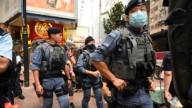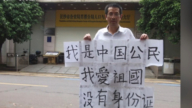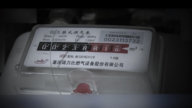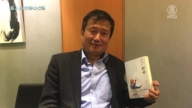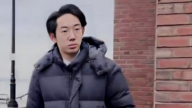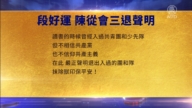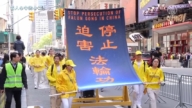【新唐人2011年8月9日訊】流亡海外20多年的「六四異見詩人」北島,日前首次獲得中共當局的邀請,回國參加活動。有評論認爲,中共當局這次讓北島回國,實際上想要通過這種所謂「招安」的手法,分化打擊其他異見人士,同時也呼籲北島:不要再次上中共的當。
北島,原名趙振開,1949年在北京出生。是當今最受國際認可的中國詩人之一。他曾獲瑞典筆會文學獎、美國西部筆會中心自由寫作獎、古根海姆獎學金,美國藝術文學院終身榮譽院士等榮譽。此外,北島還曾多次獲得諾貝爾文學獎提名。
在1989年64事件中,北島因簽名支持學運,被中共列入黑名單,而流亡海外,曾旅居七國。
北島在8月8號,將以嘉賓詩人身份,出席當局舉辦的第三屆「青海湖國際詩歌節」。
那麽,外界對於北島的這次回國,有甚麽看法呢?
中國民主運動海外聯席會議主席魏京生:「這無所謂好事,這肯定是共產黨的一種統戰政策吧。但是北島個人的情況挺複雜,就是説他幾次回去,好像有一些人想要統戰他,但是另一些人又不要他站住腳。就是每一次好像都是不成功,估計這一次可能也是會不太成功。」
1994年,北島曾經想要返回中國,但在北京入境時被遣送囘美國。2001年10月,北島獲准回國為父奔喪。
北島曾經披露,他當時回國受到嚴密監控,不能離開北京。如果有特殊原因要離京,需要特別審批。
自從2007年北島來香港任教後,一直比較低調,被外界認爲遠離政治,並盡量避開對大陸敏感話題的討論。
目前流亡台灣的內地異見詩人貝嶺,對於北島這次回國,他指出,中共當局一貫要流亡者「下跪」才准回國,「他們不但區別對待,還要你簽定協議,保證回去不涉政治活動」。近年貝嶺曾數度回國,但每次都在海關被拒入境,並且被原機遣返。
而64後流亡美國的異見學者劉再復,在「低調」多年後,也獲得邀請回國講學。
美國反政治迫害同盟執行長劉因全:「 就是把一些反對力量、意見人士分化瓦解,把他們認爲那些可以爭取的人,以『回國』這種誘餌讓他們回去,來粉飾它的『太平』。所以作爲我們異見人士來説,應該認清中共的真面目,不要上他們的當,不要做他們的統治駕馭工具。」
近年來,中共頻頻隨意剝奪境外異見人士的回國權。
詩人貝嶺、旅居歐洲的獨立中文筆會會長廖天琪、已入籍英國並持有回鄉證的作家馬建等,最近都被拒回國。王若望、劉賓雁等知名文人客死他鄉。
香港《蘋果日報》評論認爲,北京當局扭曲、綁架了中國人的回國權。而這也激起了中國人一波波的爭取回國權行動。
2007年,爲了幫助流亡海外民運人士回國,「我要回家運動」成立。
2008年,王軍濤、王丹、楊建利、胡平等發起爭取回國權運動。
新唐人記者劉惠、王子琦、王明宇綜合報導。
“June Fourth dissident poet” Bei Dao for the first time
received invitation from Chinese authorities to return to China.
Bei Dao has been in exile overseas for over 20 years.
Commentators say that the Chinese Communist Party (CCP)
tries to divide overseas dissidents by inviting Bei Dao back.
They also call on Bei Dao not to be trapped by the CCP again.
Bei Dao, formerly known as Zhao Zhenkai,
was born in Beijing in 1949.
An internationally recognized poet,
he won the Swedish PEN Literary Award,
Free Writing Award of PEN Center in West America,
Guggenheim Fellowship.
He is an Honorary Life Fellow of American Academy of Arts.
He was twice nominated for Nobel Prize of Literature.
Due to supporting the students in the Tiananmen movement,
Bei Dao was blacklisted by the CCP,
and has since lived in seven foreign countries.
On August 8, Bei Dao will attend, as a guest,
the third annual “Qinghai Lake International Poetry Festival”
held by Chinese authorities.
Then how does the public see Bei Dao’s return to China?
Wei Jingsheng
(Chair, Overseas Chinese Democracy Coalition):
It is no positive signal.
It must be part of the “united front policy” of the CCP.
But Bei Dao’s case is more complicated.
It seems that he tried to go back several times.
While some people wanted to win him over; others objected.
I guess this time he will not be successful either.”
In 1994, Bei Dao planned to return to China,
but upon arrival in Beijing, he was deported to the U.S.
In October 2001, Bei Dao was allowed to return to China
to attend his father’s funeral.
Bei Dao has revealed that he was under close monitoring
in China, forbidden to leave Beijing without permission.
Liu Yinquan (Chief Executive of
Anti-Political Persecution Alliance of China):
No matter in what way, they [e.g. Bei Dao] are happy to
be able to go back,
but when they see things not as they imagined,
they will certainly feel disappointed."
In the past few years,
Bei Dao tried to return to China, but was always rejected.
In 2002, Bei Dao announced to withdraw from
the U.S.-based organization Human Rights in China.
Wei: The CCP has been trying to “buy” overseas dissidents.
This has been the policy since Hu Jintao took office.
This can at least soften their opposing stance.
Bei Dao is no exception.
Since there is chance to return to China,
his criticism of the CCP has been reduced.
Since he came to teach in Hong Kong in 2007,
Bei Dao has maintained a relatively low profile.
The public believes that he has intentionally stayed away
from politics and avoided politically sensitive topics.
Dissident poet Bei Ling, now in Taiwan, says that
the CCP authorities always require dissidents to
“kneel down” being allowing them back.
“They even have you sign an agreement,
promising not to be involved in political activities."
Bei Ling has tried several time to return to China,
but each time he was denied entry and was deported.
Dissident scholar Liu Zaifu, after years of silence,
has also been invited back for academic purposes.
Liu Yinquan: [the CCP] intentionally disintegrates
the dissident groups, inviting back those they can win over,
in order to show its openness.
So as dissidents, we should see through the CCP’s tricks,
not to be deceived, or to be their tool of control."
In recent years, CCP has been forbidding
overseas dissidents from returning to China.
These people include poet Bei Ling,
president of the Independent Chinese PEN Liao Tianqi
and British writer Ma Jian who has a Home Visit Permit.
Well-known writers Wang Ruowang and Liu Binyan
have died overseas.
Apple Daily in Hong Kong commented that
Beijing has kidnapped Chinese people’s right to return home.
This has in turn caused Chinese people
to fight back for that very right.
In 2007, “I want to go home" movement was initiated,
to help overseas dissidents to return to China.
In 2008, Wang Juntao, Wang Dan, Yang Jianli and Hu Ping
started the movement to fight for their rights to return to China.
By 2009, Feng Zhenghu from Shanghai had been
denied entry eight times, but he kept trying,
attracting the attention from international societies.
Feng eventually was allowed to return to China.
NTD reporters Liu Hui, Wang Ziqi and Wang Mingyu


